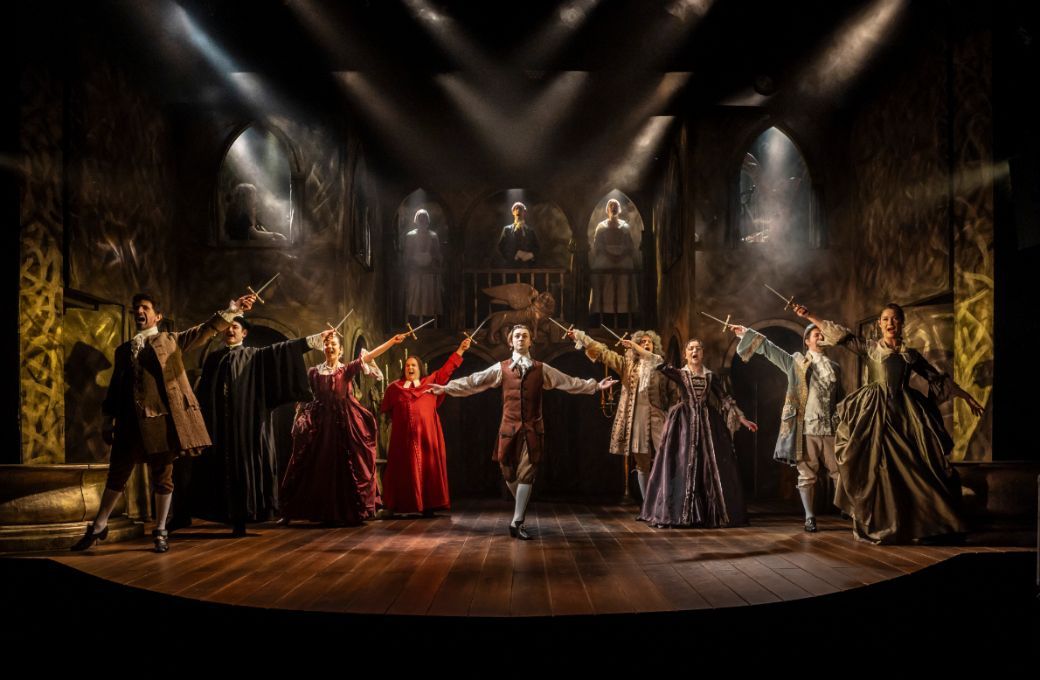“I come from a long lineage in Broadway musicals,” composer Matthew Wilder tells me. “My father was a theatrical advertiser, his father was a theatrical advertiser, and I grew up front row centre watching musicals, everything from Oliver! to The Sound of Music to Man of La Mancha. These were all part of the fabric of influence for me.” His mother, meanwhile, was an opera singer – as is Wilder’s son, a career path that skipped a generation when Wilder went into rock music. In his latest project, Stiletto, these two sides of the family business come together, using contemporary musical theatre to explore the world of 18th-century Italian opera.

Currently enjoying its debut run at London’s Charing Cross Theatre, Stiletto focuses on a fascinating and oft-overlooked corner of opera history: the role of castrato singers, representing a controversial tradition where boys were castrated before puberty to preserve their high vocal range.
“Historically, the castrati were relegated to playing the female roles in opera,” Wilder explains. “Women were not allowed to appear on stage.” This overlapped with the Vatican’s ban on female singers in church choirs, resulting in a period of several hundred years where castrati played a key role in Europe’s religious and secular music.
A passion project decades in the making, Stiletto follows the life of a fictional castrato named Marco, who achieves a complicated kind of success as a singer. On the one hand, popular castrati were, in Wilder’s words, “the rock stars of their day.” Some are still recognizable names today, such as the 18th-century superstar Farinelli, whose tumultuous life has been adapted several times for the stage and screen. Yet despite their opportunities to reach a high status in the music world, castrati also inhabited an ambiguous role in society, viewed in some ways as second-class citizens. This stigmatized position was both social and legal, essentially casting castrati as a third gender that stood apart from men and women.
“In those days, Italian Catholic families would have many children,” Wilder explains. “And should one of them be able to carry a tune – woe be to them.” Castrated at the age of eight, Marco is scouted by a representative of a conservatory, who pays off his family so he can begin musical training. Within this rigorous system, “the child would be taken into the conservatory and trained to enter the choir, and if they were exceptional, they would go on to be great opera stars.”
At the beginning of Stiletto, Marco is headed for fame and fortune under the tutelage of his mentor-turned-lover Faustino. But then he meets Gioia, a startlingly talented singer whose genius disrupts Marco’s worldview. As a Black woman in a fundamentally racist and sexist society, Gioia faces tremendous barriers to success – and in her, Marco sees a kindred spirit. “These are two characters that come from opposite worlds but have the same challenges, if you will,” says Wilder. Careful to avoid spoiling the show’s final act, he teases that this ultimately becomes a life-changing relationship, as Marco and Gioia “join forces to bust the system.”
Working with librettist Tim Luscombe and director David Gilmore, the current version of Stiletto took shape over the past four years, working from a concept and score that Wilder has been developing since the 1980s. He first became interested in castrati after reading a nonfiction book on the topic, gifted to him by his opera singer mother. At that point in his life he was still focusing on his career as a solo artist, best known for the synth-pop single “Break My Stride”. Later on he composed the songs for Disney’s Mulan (earning an Oscar nomination in the process), and embarked on a long career as a producer. Throughout this time, Stiletto remained on the back-burner – in part because the world of musical theatre took a while to catch up with his creative vision.
“There were certain topics that were considered taboo,” says Wilder, acknowledging his earlier struggles to get Stiletto off the ground. “Over time, as things seemingly became more open-minded, I was able to travel into areas that I was unable to speak about several decades ago.” Reading between the lines, the post-Hamilton era has created more freedom to explore stories like this one, combining historical drama with social commentary about race, gender and sexuality. Crucially, Stiletto is also a wholly original idea (“Not based on any adaptation of a novel or a film,” Wilder notes), which can be a hard sell in any corner of the entertainment industry.
As a musical that celebrates opera but doesn’t necessarily try to sound like classical opera, Stiletto presented some exciting creative opportunities. “We really have strived to marry the then and the now,” says Wilder, who drew inspiration from the 18th century setting alongside his background in chart-topping pop and rock.
“We had what I would consider to be a quite a deep collection of demos that I had endeavored to record over the years. Experimentation was key for me to figure out how much of the classical world versus the contemporary language of music did I want to incorporate.”
Noting some similarities with the creative process behind Mulan, which incorporated traditional Chinese elements into a catchy Disney score, he wanted to write something emotive and contemporary that also evoked the historical atmosphere. Stiletto’s orchestration features harp, oboe, cello and string quartet, a lineup “that provided us with a certain language to create this sense that you’re in a Baroque environment.” At the same time, Wilder emphasizes that “We’re not trying to represent opera legitimately.”
One of the most intriguing challenges was, of course, the casting of Marco. Wilder is reticent about revealing exactly how the show pays homage to the unique sound of castrato vocals (“We’d like the illusion to be protected”) but it seems that they found the right talent in leading man Jack Chambers, who performs opposite Jewelle Hutchinson as Gioia.
With sumptuous historical costumes brought in from the Royal Shakespeare Company, Stiletto aims to be an old-school crowd-pleaser; a sweeping tale about outsiders triumphing against the odds, bringing a modern perspective to a very specific historical era. However, Wilder notes, “I don’t want to turn this into a simple cartoon. It’s not. It’s complex. There’s a lot of humanity in what we’re trying to discuss.”
And even after decades of development, Wilder continued to discover new meaning in this story as the show prepared for opening night. “While we were busily putting it together, I didn’t have the luxury of being able to really understand or have an ‘aha!’ moment. But once the cast really started to get it under their skin, and the tempo started to take shape, there were certain reveals for me that I wasn’t even cognizant of at the time.”
In the grand tradition of off-Broadway and off-West End productions, the show may also continue to evolve after it completes its initial run. Wilder hopes that Stiletto will have a future on a bigger stage, expanding the scope of Marco and Gioia’s story. “We are a small production with a large idea,” he says of the Charing Cross Theatre run. “This is an illustrious sketchpad right now, and we hope at some point that we’re going to be able to show all its colors.”
Stiletto runs at Charing Cross Theatre until 14th June.
This article was sponsored by Make A Noise Ltd.


